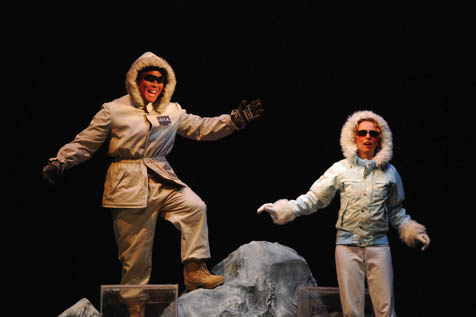Angels in America. At UCSB’s Hatlen Theatre, Friday, May 25.
Angels in Goleta

At one point in Tony Kushner’s Angels in America, Part One: Millennium Approaches, Louis Ironson (Justin Gillman) shares a lunch of hot dogs and a dessert full of innuendo with Joe Pitt (Merlin Huff). Louis is openly gay; Joe, a married, Mormon, Reagan-supporting Republican, is fighting the realization that his entire life has been a lie. Louis asks Joe what he thinks it might be like to be the son of the zeitgeist. Although in the play the question is about then-president Reagan’s son Ron, the question could just as easily be asked about Angels author Tony Kushner. Angels is set in the mid 1980s, several years before it was written. Kushner captures the cold, brash, self-absorbed ’80s so perfectly that the extra vision provided by several years of hindsight seems only to have focused his view. Seen through the intersection of the lives of a group of homosexual men and their Republican colleagues and neighbors, this play is itself a legitimate child of the ’80s zeitgeist.
Perhaps the most vivid representation of this is Prior Walter (Ryan Lockwood), who is living with full-blown AIDS. Facing death from a cause which is not yet fully understood, marginalized by society, and seeing his lover losing emotional control, he embarks on a spiritual journey of his own. The results of this journey are cut short at the end of Part One, leaving plenty of room for speculation as to the plot developments of Part Two. Despite the loose ends, however, Prior’s story is one of hope, in addition to being a chilling reminder that AIDS is still very much a part of our society and our times.
Aside from the weighty implications of UCSB’s production of Angels, director Irwin Appel and his technical staff have produced a show with outstanding aesthetics. Tal Sanders’s abstract set design evokes the skyscrapers of New York, while providing ample space for the vignettes that compose the scenes. Except for Gillman, who performed as Louis with grace and depth, every member of the cast took on at least two roles. Despite the small sets moving in and out of the wings, and the actors in multiple roles, the production was coherent and cohesive-which only served to make the fragmentary emotions of Angels more apparent and more effective. Angels may at times be long-winded, or even preachy, but it is easy to forgive these sins and see only the powerful storytelling and evocative settings it has to offer.



